
QUEUEING SYSTEMS
Scope & Guideline
Innovative Insights into Operational Efficiency
Introduction
Aims and Scopes
- Theoretical Developments in Queueing Models:
This area includes the formulation and analysis of new queueing models, such as multi-class, multi-server systems, and priority queues, which enhance the foundational understanding of queueing behavior in complex environments. - Applications of Queueing Theory:
The journal emphasizes the practical applications of queueing theory to real-world problems, including telecommunications, transportation, healthcare, and service operations, allowing researchers and practitioners to optimize system performance. - Stochastic Processes and Control Techniques:
Research often explores stochastic processes underlying queueing systems, including arrival and service time distributions, and control strategies such as admission control, scheduling, and resource allocation to improve efficiency. - Adaptive and Learning Approaches:
Recent studies incorporate adaptive methodologies and machine learning techniques to optimize queueing systems dynamically, reflecting a growing interest in data-driven decision-making in operational contexts. - Performance Analysis and Optimization:
The journal features works that focus on performance metrics such as waiting times, service levels, and system stability, along with optimization techniques to enhance system performance under varying conditions.
Trending and Emerging
- Integration of Machine Learning and AI in Queueing Systems:
There is a growing trend towards incorporating machine learning and artificial intelligence techniques in queue management and optimization, allowing for real-time decision-making and adaptive control based on historical data. - Dynamic and Adaptive Queueing Models:
Recent research increasingly focuses on dynamic models that adapt to real-time changes in customer behavior and service processes, such as those found in ride-hailing and healthcare systems, indicating a shift towards more realistic modeling. - Game-Theoretic Approaches in Queueing Theory:
The application of game-theoretic concepts to queueing systems is on the rise, exploring strategic interactions among customers and service providers, which reflects a broader interest in behavioral economics within queueing contexts. - Multidimensional and Complex Queueing Networks:
There is an emerging emphasis on analyzing complex queueing networks that involve multiple interacting queues, reflecting the need to address interconnected service systems in modern applications. - Focus on Sustainability and Resource Efficiency:
Research that addresses sustainability and resource efficiency in queueing systems is gaining traction, particularly as industries seek to optimize operations while minimizing environmental impact.
Declining or Waning
- Classical Queueing Models:
There has been a noticeable decrease in publications focusing on traditional queueing models without enhancements or novel applications, suggesting a shift towards more complex, adaptive models that reflect contemporary operational challenges. - Basic Performance Metrics without Contextual Analysis:
Studies that solely report basic performance metrics, such as average wait times or queue lengths, without contextual application or advanced analysis are becoming less common, as the field moves towards integrating metrics with practical implications. - Static Queueing Analysis:
The focus on static or fixed analysis of queueing systems is waning, with more research gravitating towards dynamic and adaptive systems that account for variability in customer behavior and operational conditions.
Similar Journals
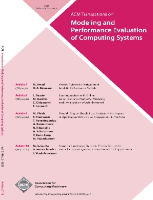
ACM Transactions on Modeling and Performance Evaluation of Computing Systems
Transforming Ideas into Performance Solutions.ACM Transactions on Modeling and Performance Evaluation of Computing Systems, published by the Association for Computing Machinery, is a leading journal dedicated to the exploration of innovative modeling techniques and performance evaluation methodologies applicable across various computing systems. With an ISSN of 2376-3639 and an E-ISSN of 2376-3647, this esteemed journal serves as a vital resource for researchers, professionals, and students within the computer science community, particularly in the categories of Computer Networks and Communications, Hardware and Architecture, and Software Engineering. Its impressive impact factor, marked by a categorization in the prestigious Q2 and Q3 quartiles across several fields, demonstrates its significant contribution to advancing knowledge in performance evaluation and modeling. Though currently not open access, the journal provides invaluable insights that enhance understanding of safety, risk, reliability, quality, and other critical aspects of computing systems. By bridging theoretical foundations with practical applications, ACM Transactions is essential for those seeking to push the boundaries of computing systems performance and reliability, making it an indispensable addition to any researcher’s or practitioner’s academic toolkit.
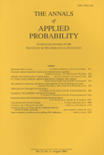
ANNALS OF APPLIED PROBABILITY
Catalyzing Progress in Statistics and ProbabilityANNALS OF APPLIED PROBABILITY is a prestigious journal dedicated to advancing the field of applied probability, providing a platform for rigorous research and innovative applications. Published by the Institute of Mathematical Statistics (IMS), this journal has earned a reputable standing in the academic community, reflected in its 2023 ranking as Q1 in both Statistics and Probability and Statistics, Probability and Uncertainty. With a focus on disseminating high-quality articles, it plays a critical role in bridging theoretical advancements and practical applications in various domains of probability. The journal features a robust editorial process and attracts contributions from leading researchers, fostering a vibrant discourse essential for academic and professional development. Researchers and practitioners seeking to deepen their knowledge and stimulate intellectual growth will find the ANNALS OF APPLIED PROBABILITY an invaluable resource, with its significance exemplified by its Scopus rankings that showcase its influence within the statistics community.
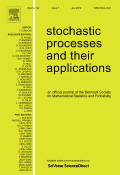
STOCHASTIC PROCESSES AND THEIR APPLICATIONS
Pioneering Insights in Applied Mathematics and SimulationSTOCHASTIC PROCESSES AND THEIR APPLICATIONS, published by Elsevier, is a leading journal in the realms of Applied Mathematics, Modeling and Simulation, and Statistics and Probability. Established in 1973 and continually evolving with the latest research trends, this journal has secured its place in the Q1 category across multiple disciplines, reflecting its influence and prestige in the academic community. With a Scopus Rank of #90 in Statistics and Probability and notable rankings in Applied Mathematics and Modeling and Simulation, it serves as a crucial platform for disseminating cutting-edge research findings and applications of stochastic processes. Although it operates under a traditional access model, its comprehensive scope encourages submissions from a diverse range of topics that push the boundaries of knowledge in probability theory and its practical applications. Researchers, professionals, and students are invited to contribute original research, reviews, and case studies that can propel the field into new territories, further solidifying the journal's role as an essential resource for advancing understanding in stochastic processes.

Applications and Applied Mathematics-An International Journal
Fostering Collaboration to Elevate Applied MathematicsApplications and Applied Mathematics-An International Journal, published by Prairie View A & M University, Department of Mathematics, serves as a pivotal platform for disseminating high-quality research in the interconnected realms of mathematics and its practical applications. With its ISSN 1932-9466, this journal invites contributions focused on novel methodologies, theoretical advancements, and empirical studies that underscore the vital role of mathematics across diverse disciplines. Although it currently does not offer open access options, the journal is committed to advancing knowledge and fostering collaboration among researchers, professionals, and students seeking to explore the application of mathematical concepts to real-world problems. As it gains prominence in the academic community, Applications and Applied Mathematics aspires to maintain a robust editorial process to ensure the rigor and integrity of published research, subsequently contributing to the advancement of both theoretical and applied mathematics.

Mathematics in Applied Sciences and Engineering
Advancing innovation through mathematics and engineering.Mathematics in Applied Sciences and Engineering is a pioneering Open Access journal published by WESTERN LIBRARIES in Canada, dedicated to advancing the field of applied mathematics and its integration into engineering practices. With an E-ISSN of 2563-1926, this journal has been actively disseminating critical research since its inception in 2020, and aims to foster innovation and collaboration among researchers, professionals, and students alike. The journal excels in covering important topics within applied mathematics, modeling, and simulation, despite its current standing in the Q4 quartile for these categories according to the 2023 rankings, indicating significant opportunities for growth and contribution in these fields. Positioned in a competitive academic landscape—ranked #437 out of 635 in Applied Mathematics and #253 out of 324 in Modeling and Simulation—this outlet serves as an accessible platform for scholarly exchange, ensuring that emerging ideas and methodologies reach a broad audience while maintaining a commitment to academic integrity and quality.

International Journal of Fuzzy Logic and Intelligent Systems
Leading the Charge in Computational InnovationInternational Journal of Fuzzy Logic and Intelligent Systems, ISSN: 1598-2645, is a prestigious journal published by the Korean Institute of Intelligent Systems, dedicated to advancing the fields of Artificial Intelligence, Computational Theory and Mathematics, Computer Science Applications, Logic, and Signal Processing. Established to foster interdisciplinary research, this journal has quickly established its reputation, reaching a respectable Q3 quartile ranking across multiple categories in 2023. It serves as a vital resource for researchers, professionals, and students, offering insights into cutting-edge methodologies and innovative applications of fuzzy logic and intelligent systems. With a focus on disseminating high-quality research, the journal attracts contributions that drive the evolution of intelligent technologies and their practical implications. Published from South Korea, the journal is positioned to impact the global community, facilitating a deeper understanding of intelligent systems in various domains.
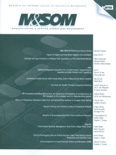
M&SOM-Manufacturing & Service Operations Management
Leading the Charge in Operations Management InnovationM&SOM - Manufacturing & Service Operations Management, published by INFORMS, is a leading journal dedicated to advancing the field of operations management since its inception in 1999. With an impact factor that reflects its reputation as a top-tier publication, M&SOM is categorically ranked in Q1 for both Management Science and Operations Research, as well as Strategy and Management, positioning it among the elite journals in its domain. Practitioners and scholars alike benefit from insightful research that addresses critical challenges in manufacturing and service operations across diverse industries. The journal's commitment to fostering innovation is evident through its rigorous peer-review process, ensuring the publication of high-quality articles that contribute significantly to theory and practice. Researchers, professionals, and students engaged in operations management will find M&SOM a vital resource for the latest trends, methodologies, and strategic insights.

Journal of Systems Science and Systems Engineering
Elevating knowledge in systems science through rigorous scholarship.Journal of Systems Science and Systems Engineering is a prestigious academic journal aimed at fostering discourse and research in the interdisciplinary fields of Control and Systems Engineering and Information Systems. Published by SPRINGER HEIDELBERG in Germany, this journal is dedicated to advancing the understanding of complex systems through innovative methodologies and comprehensive theoretical frameworks. With its Q3 quartile rankings in both fields for 2023, it reflects a growing influence in the academic community, as evidenced by its Scopus rankings, which place it in the 45th and 40th percentiles, respectively. The journal encourages both empirical and theoretical contributions, making it a valuable resource for researchers, professionals, and students passionate about system science. Although it does not offer open access, the journal's commitment to rigorous peer review ensures high-quality, impactful research that contributes significantly to the scientific advancements in these domains.
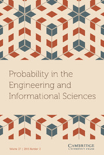
PROBABILITY IN THE ENGINEERING AND INFORMATIONAL SCIENCES
Bridging theory and application through innovative probabilistic research.PROBABILITY IN THE ENGINEERING AND INFORMATIONAL SCIENCES is a premier journal published by Cambridge University Press, dedicated to advancing the fields of statistics, probability, and their applications within engineering and informational sciences. With an ISSN of 0269-9648 and an E-ISSN of 1469-8951, this journal has established itself as a significant resource since its inception in 1987, continuing to publish impactful research through 2024. Ranking in the Q2 category for Industrial and Manufacturing Engineering and holding Q3 status in multiple relevant categories, it boasts a respectable impact in academia, reflected in its Scopus rankings across various disciplines. Although not an open-access journal, it remains essential for researchers interested in the integration of probabilistic methods in contemporary engineering challenges. By providing a platform for innovative studies and practical applications, PROBABILITY IN THE ENGINEERING AND INFORMATIONAL SCIENCES plays a crucial role in shaping future research and methodologies in these overlapping domains, fostering collaboration and knowledge exchange among researchers, professionals, and students alike.

JAPAN JOURNAL OF INDUSTRIAL AND APPLIED MATHEMATICS
Pioneering Research at the Intersection of Math and IndustryThe Japan Journal of Industrial and Applied Mathematics, published by Springer Japan KK, is a pivotal platform for disseminating cutting-edge research in the fields of applied mathematics and engineering. With an ISSN of 0916-7005 and an E-ISSN of 1868-937X, this journal has been a cornerstone in the academic community since its inception in 1991 and will continue to contribute pivotal insights through 2024. Positioned in the Q3 category for both Applied Mathematics and Miscellaneous Engineering according to 2023 rankings, it is recognized for its diverse range of topics and interdisciplinary approaches. Despite its competitive ranking, the journal fosters valuable contributions that challenge conventional methodologies and inspire innovation. Researchers, professionals, and students alike will find the journal’s contents invaluable for advancing knowledge and exploring new methodologies in industrial and applied mathematics.